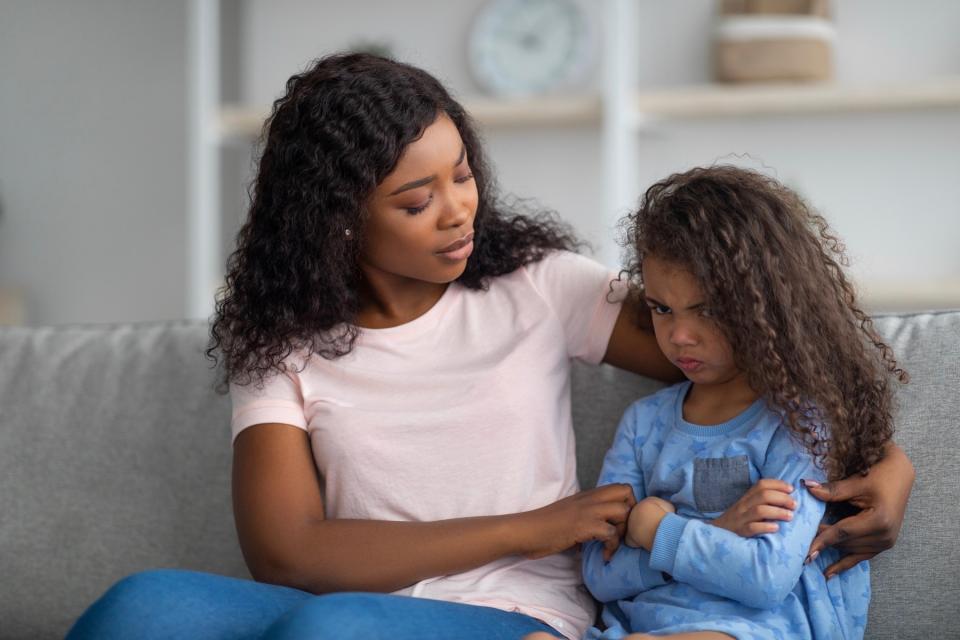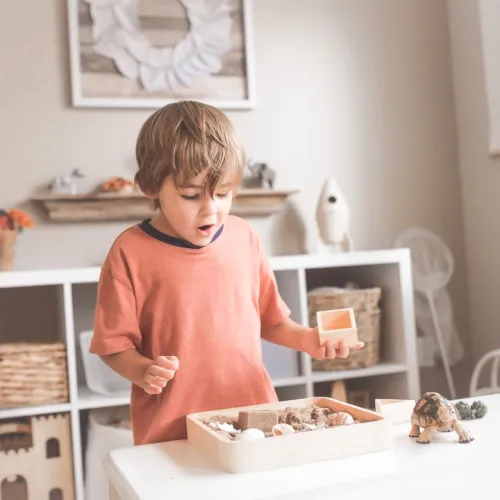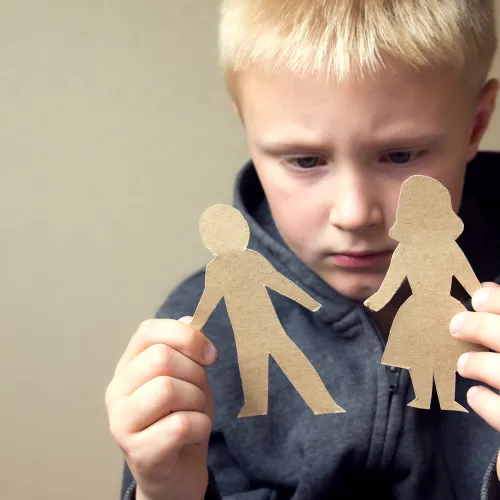Life after Divorce: What to Do When Your Child Wants Their Other Parent
It’s not easy to listen to your child ask for their other parent when they’re with you, but if you respond with empathy and clarity, it could have a big impact on your child.
Kids have a lot of adjusting to do after a divorce or separation. Splitting the family into two different homes with different routines is a cataclysmic event, and it takes time to get used to moving between one home and the other.
It's normal for kids to miss one parent when they are living with the other. And they might express these feelings—sometimes gently, but other times quite bluntly. Little ones may cry, whereas older kids and teens might ask to spend more overnights with their other parent or even live with that parent full time.
Here’s how to comfort a child who misses a parent in the context of divorce or separation, including what to do when your child wants to live with the other parent.

Some children experience separation anxiety in new co-parenting situations
What is separation anxiety or Separation Anxiety Disorder in co-parenting?
Even without a divorce in the mix, it’s normal for children to feel anxious when separated from a parent. They may cry, cling to that parent, or act out after they leave.
Divorce intensifies the situation because it can make children worry that they’re losing a parent. Being physically separated from that parent can bring up that emotional fear, which then deepens the anxiety.
Separation anxiety can even rise to the level of a disorder. Psychology Today explains that a child who has Separation Anxiety Disorder regularly experiences an “extreme state of distress” when the child is away from someone they love and feel very attached to, often a parent.
(It’s a bit similar to a toddler getting attached to a lovey and freaking out when they can’t find their threadbare teddy bear—except this is next-level because it’s an actual living person who takes care of them.)
Many kids experience separation anxiety after their parents split, so it’s not necessarily abnormal. But if the anxiety is intense and long-lasting, it may be time to talk to a psychologist.
(As a divorced or separated parent, you might realise your kid isn’t the only one with anxiety. Divorce anxiety is real.)
What does separation anxiety look like?
Younger kids are likely to cry and cling, but older kids might stew, yell, or struggle with eating and sleeping. Here are some common ways the anxiety appears, from Verywell Family:
- Anger and frustration
- Anxiety attacks
- Bouts of crying
- Changes in appetite
- Difficulty sleeping
- Fear
- Increased irritability
These behaviours are a blend of rational and emotional responses. Your child and their other parent will be separated for some time, and your child will miss that parent—but they’ll see that parent again soon, and meanwhile they’ll be safe and loved.
Even if their fears are mostly irrational, your response should be balanced on empathy, calmness, and consistency.
(Quick tip: If your child misses their other parent at bedtime, it can help to build a new routine that doesn’t remind your child of their other parent.)
How do you handle separation anxiety?
Psychology Today shares that treating your child’s emotions with respect can actually help quell the fear. It might make it worse if you tell your child to be tough or stop crying. If your kid feels like they have to pretend they aren’t upset, it can actually intensify the negative emotion.
Instead, they need help processing the emotion. (See the section titled “What should you SAY if your child wants their other parent?”)
Keeping a predictable handover routine is also helpful. Then the switch might feel uncomfortable, but at least it won’t feel surprising. Stay calm and act like the exchange is normal and fine, not scary and problematic. Keep the exchange polite and short, so there’s no time for your child’s emotions to work into a frenzy, and they can just jump into adjustment mode.
If the problem is intense and/or doesn’t go away, consider finding a child therapist. Therapy can give children concrete emotional tools that help them cope with stresses in healthier ways.
Consider your kid’s age, too—it will have a huge impact on how you can help them process their anxiety. If you have a little kid, you’ll need to know what to do when your child cries for their other parent. If you have a teen, you might need a lot of patience with sullen moods. Verywell Family breaks it down with separation anxiety advice for each age group.
Some kids have a preferred or favourite parent
Not all kids respond to separation with anxiety specifically. They might simply feel sad, lonely, or grumpy, especially if the child favours one parent after divorce.
It can hurt to know that your child has a favourite and it isn’t you. But it’s actually pretty normal. What To Expect reminds us that preferring one parent is a phase, and it won’t last forever.
Also, keep in mind that the favouritism of the other parent might not be a poor reflection of you. Possibly, it’s the total opposite. If your child feels secure in your love but insecure in your co-parent’s love, they may cling to your co-parent. (Of course, that doesn’t make it stop hurting when your teenager wants to live with the other parent. But it may be of some small comfort.)
Keep showing your love without missing a beat. Even if you feel spurned by your child’s favouritism, demonstrating love is the best thing you can do for them. It will also help you feel like you still play an important role in their life, which you absolutely do.
What should you THINK when your child misses or wants their other parent?
Don’t take it personally
Your child may be very frustrated at this moment—and as a result, they might express their feelings in a way that causes you some heartbreak. Although it is difficult, try not to take these interactions personally.
Sure, your child knows exactly how to push your buttons. But most of the time in these situations, that’s not their motivation. There’s some underlying anxiety, anger, or sadness, and this is how it’s coming out.
Try to remain calm, and do your best to not project your own fears onto these moments. What matters is caring for your child and watching out for their best interest.
Your child feels safe in your love
It may seem counterintuitive, but when children feel insecure and scared, they are less likely to act out—until they get to an environment where they feel they’ll still be accepted even if they behave poorly.
That’s why some kids behave beautifully at school or daycare but turn into little terrors at home. (Or why you might be more likely to snap at your kids than at your coworkers.)
So it might be a (very backhanded) compliment if your kid cries or rages when missing their other parent. Your kid feels safe enough to express their upset feelings around you.
Have empathy for your child's emotions
Look at the situation from your child's perspective. It hasn’t been easy for them to cope with all this change at once, and some resistance to it is honestly pretty normal.
If you try to understand where your child is coming from in these moments, you might come up with better ways to talk to them in a warm and peaceful manner (which can help calm your child down).
What should you DO when your child wants their other parent?
Keep your composure
It’s hard to hear your child say they want their other parent, but don't let this break your cool. Stay calm and collected, resisting any urge to get angry or upset in front of your child. Even if they aren't expressing it now, your child looks to you for stability and structure in life.

Help your child calm down
If your child’s emotions are running high and hot, it might be hard to have a productive conversation. So it might be worth taking a moment to calm down together.
One simple but surprisingly effective grounding exercise uses your five senses. Encourage your child to find 5 things they can see, 4 things they can touch, 3 things they can hear, 2 things they can smell, and 1 thing they can taste. Or do the exercise together! For extra impact, pay close attention to each thing and describe it, internally or aloud.
If your child or teen needs more time to settle, encourage them to take a hot shower or bath, use an ice pack, or do 5 minutes of jumping jacks. Or, watch a funny movie together to evoke opposite emotions.
Of course, calming down looks very different for an infant versus a high schooler. Check out the Gottman Institute’s “Age-By-Age Guide to Helping Kids Manage Emotions.”
Have the conversation
It would be easy to avoid the conversation or put it off. To just tell your kid that you don’t want to discuss it. But this won’t help either of you. Your child needs to process it to get through it. And if they want to adjust parenting time, then you need to fully understand their feelings in order to make the right decisions.
It takes courage, but having the conversation will bring clarity and possibly even calmness to your home.
Stand your ground—peacefully
Sometimes, your kid might not want their other parent exactly, but rather they want that parent’s lifestyle while at your house. Maybe they want to stay up late (but you stick to a bedtime), play video games (but you limit screens), or eat mac & cheese for the 3rd meal in a row (but you insist on veggies).
It's okay to have different house rules and guidelines. You are the parent, and when your child is with you, it is normal and reasonable to require them to follow your household rules.
If you believe in your rules, then stand by them in order to create structure and expectations for your child. Children thrive on boundaries. Of course, do it as calmly and peacefully as you can.
(At the same time, it might not hurt to evaluate your own rules from time to time to make sure they’re still in your child's best interests as they grow and change.)

Talk to your co-parent about it
If possible, open a dialogue with your co-parent. You might need to coordinate as you figure out how to support your child as they transition between homes.
Talk about what you have each experienced with your child, then look for better ways to support them when they’re missing one of you. Perhaps you and your co-parent can set up more frequent phone calls or video chats with your child.
Your child isn't the decision maker, but you can listen to their comments and requests for adjustments to the schedule. For example, maybe your child is asking to stay a few hours later with one parent in order to watch a tennis match on TV, or maybe you could switch weekends with your co-parent and take your child on a special trip.
Consider talking with your co-parent to negotiate minor adjustments to your parenting schedule here and there to make your child more comfortable. If you do make modifications to your schedule, document them in case there’s any confusion down the road.
What should you SAY if your child wants their other parent?
Validate your child’s emotions
Validating doesn’t mean agreeing—it just makes the child feel like you hear their complaint or request, and you understand what they are feeling. You don’t have to say, “Sure, you can live at Dad’s house,” but you can say, “I know you miss your Dad when you’re apart. It makes sense that you feel upset.”
Avoid badmouthing your child’s other parent
If you feel negatively toward your co-parent, it might be tempting to share those feelings with your child to influence them to like you more than their other parent. But research from the Family Institute shows that when a co-parent badmouths the other parent, the kids grow up to have a strained relationship with both parents. But their relationships are especially strained with the badmouther, rather than the parent they heard negative things about.
There are other, safer ways to vent your emotions without involving your children.
Say positive or neutral things about the other parent (when appropriate)
This might sound difficult, but it’s easier if you focus on your child’s experience, not your co-parent as a person. For example, instead of saying, “You’re better off with me,” or, “Your Mom doesn’t take good care of you,” try saying, “I’m so glad you had a nice week at Mom’s house.”
You don’t need to lie, but you can pick and choose what you emphasise. It will have a strong impact on your child. If you focus on the positive, then your child won’t feel like they have to pick between their parents or view one as good and one as bad.
What if your child wants to live with their other parent full time?
Most of the time, children benefit from having good relationships with both parents.
But if your child wants to live with their other parent full time, give your child space to express how they feel, and listen openly. But don’t allow them to be rude—if they need help, guide them through rephrasing some statements. “Papa’s house is stupid” is unkind, but “I feel more comfortable at Dad’s house” is clear without being cruel.
One factor to consider is whether your child or teen has siblings, and whether this change would result in less sibling time together.
You could also ponder whether your child is mature enough to take part in such a big decision. Many courts start to consider the child’s opinion more seriously at age 12. And teens are more likely to ask for a shift in parenting time in the first place.
Keep in mind that you don’t have to make an all-or-nothing decision, even if it’s what your teen requests. You could move from 50:50 custody to having just one overnight per week (if that’s right for your family). This even works if your teenager wants to live with their non-custodial parent. You still get a regular touchpoint to stay connected with your child, but they also get to live mainly with their other parent.
It’s hard for either parent to see this decision from a neutral position, so it may be helpful to consult a family counsellor or family mediator. They can help you make this decision in a way that protects your child’s best interest.
It can hurt when your child wants the other parent. But you will always matter to your child, too.
Easier said than done, but remind yourself that you will always be there for your child and they will—now or eventually—appreciate that.
If these situations become too complex to handle alone (for example, if you make a major change to the schedule), don't hesitate to contact a family law or mental health professional.







